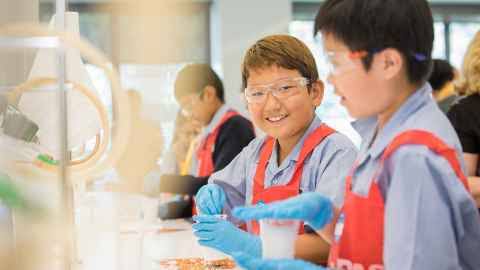A kids’ lab was set up at the University of Auckland to allow primary school children to conduct science experiments in real-life labs.
More than 450 Auckland primary students – including children from Farm Cove Intermediate School and Pakuranga Heights School were scientists for the day in the University’s School of Chemical Sciences. Seven schools participated over three days.

The children, aged between 6 and 12, carried out hands-on, safe and colourful experiments under the supervision of scientists from the University.
Locally organised in partnership with chemical company BASF, the programme provided primary school children from a range of deciles with the opportunity to explore the wonders of chemistry in daily life.
The children experimented with:
Super Absorber – super absorber polymers demonstrate that some chemicals are able to hold several times their weight in water.
Insta Worms – instant thermochromic worms allows kids to observe the relationship between heat and thermochromic dye and how polymers are formed.
Recycling Dirty Water – different methods of separation are used to remove impurities from wastewater.
Colours in Nature – kids learn how colour from vegetables, fruits, or flowers can be extracted, and that this natural colour changes easily with variations in acidic or basic level.
The University of Auckland’s Dr Peter Swedlund, who co-presented the annual event with laboratory manager Katrina Graaf, said there is a budding scientist in every child.
“Engaging students with relevant science experiments opens their eyes that science relates to everyone and can be the start of a lifelong passion,” Dr Swedlund said.









